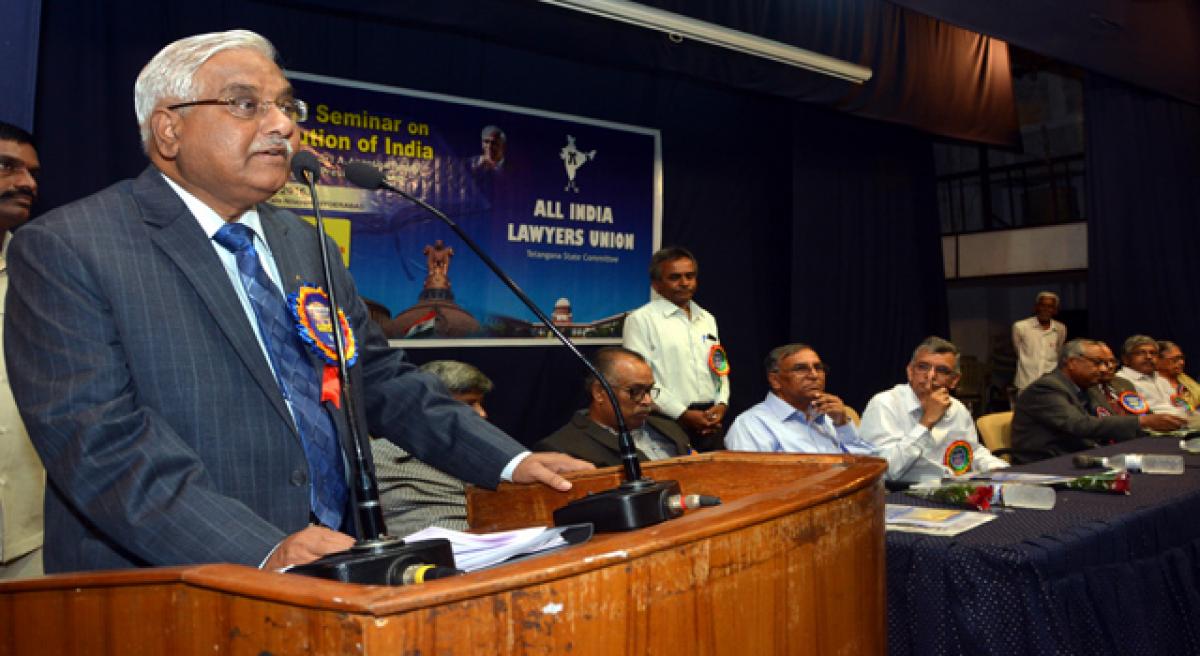Live
- Tim Southee matches Chris Gayle's six-hitting record in his farewell Test
- AP Mnister Ponguru Narayana Inspects Highway Connectivity Roads to Amaravati
- Reduced inflow: Water levels in Chembarambakkam, Poondi reservoirs drop
- Slapgate haunts CM as Rohini slams Nitish following Patna DM’s action against BPSC candidate
- Amazon Music India Unveils 'Best Of 2024’ Celebrating Top Hits, Artists & Podcasts
- Kejriwal writes to HM Shah on law and order, seeks urgent meeting
- Big e-commerce firms to adopt Safety Pledge on National Consumer Day
- Cop ends life over torture by wife, father-in-law in Bengaluru
- Indian Constitution longest and most beautiful, Kiren Rijiju lauds its inclusive character
- BSNL's Rs 333 Plan Challenges Airtel and Jio with 1300GB Data: Details
Just In

Supreme Court judge Justice V Gopala Gowda on Saturday stressed the need for serious introspection and urgent measures to strengthen the mechanism to achieve the goals of the Constitution.
Hyderabad: Supreme Court judge Justice V Gopala Gowda on Saturday stressed the need for serious introspection and urgent measures to strengthen the mechanism to achieve the goals of the Constitution.
Delivering the first “A Anantha Reddy Memorial Endowment” lecture at a national seminar organised by All India Lawyers Union (AILU) at Sundarayya Vigyana Kendram here, Justice Gowda said, the directive principles and fundamental rights enshrined in the Constitution supplemented each other as it was pointed out by the first Prime Minister Jawaharlal Nehru. “The Constitution is not just a legal document but it governs every aspect of their lives,” he said
Expressing concern over growing incidents like Nirbhaya in the country contrary to the constitutional objectives and ideals, he said that the apex court had been interpreting the provisions to strengthen the Constitutional provisions. He said the Supreme Court had interpreted the Constitution as an “Organic Document,” while delivering its verdict in the Keshawananda Bharathi case.
However, later the Constitution had been termed as a “Political Document” and “Human Science.” Because, in a democracy, no system functions without a political ideology and it is against this backdrop that the functioning of the Constitution should be understood that there is an inherent relationship between the fundamental rights which are at the heart of the Constitution and directive principles, a soul of the Constitution that obligates the State to achieve a just and equitable society as it has been set out in the preamble,” he added.
Delving in-depth on several issues in agriculture, education, health, employment and women and child welfare and empowerment, Justice Gopala Gowda said the issue emerging from these sectors had been posing serious challenges, undermining the workings of the Constitution in the country.
Similarly, the Directive Principles obligated the State to provide compulsory free education up to the age of 14 years. However, it remained a dream until the enactment of Right to Education Act recently.
However, the amended Child Labour Act recently allowed children below the age of 14 years to work to lend help to their parents. This nagated the spirit of Right to Education. Similarly, situation prevailed in higher education which remained a dream for majority of people, in particular, from the rural areas.
It was against this backdrop, the apex court had made it clear in one of its judgments that the urban-oriented ‘meritocracy alone’ could not be counted contributing to the development of the country, Gopala Gowda said. Lack of the much-needed health infrastructure and disparities in delivering gender justice in property rights to women, atrocities against women had been posing serious challenges undermining the functioning of the constitution, he said.
The Constitution guaranteed not only providing equitable opportunities but also confirming the right to live with dignity. This was set out in the assurance given by the Constitution to provide social, political and economic justice to all its citizens.
The judge unveiled the souvenir of the AILU and released a book on Dr B R Ambedkar written by Dr S N Busi. Former Karnataka High Court judge H N Naga Mohan Das, former MLC Prof K Nageswar, former CEST Appellate Tribunal member Dr Busi also spoke at the seminar. Telangana AILU leader G Vidyasagar, Andhra Pradesh Bar Council chairman A Narasimha Reddy were among the other dignitaries present on the occasion.

© 2024 Hyderabad Media House Limited/The Hans India. All rights reserved. Powered by hocalwire.com







